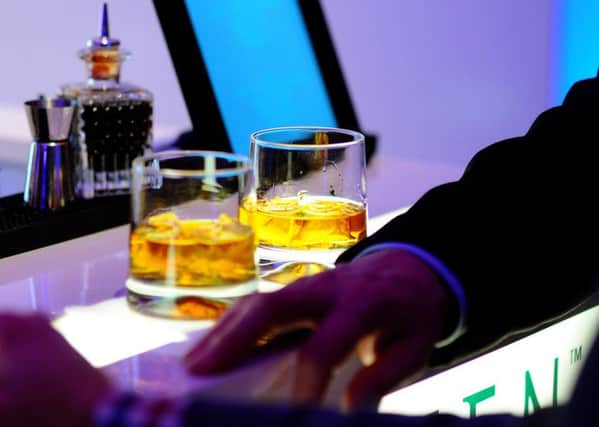Ben Lowry: Mooted licensing law reforms are so modest as to be a missed opportunity


There has been barely any movement. Gradually, however, there has been an edging towards some sort of extension of opening hours.
In 2012 the Department for Social Development consulted on proposed changes to the law regulating the sale and supply of alcohol.
Advertisement
Hide AdAdvertisement
Hide AdTwo years ago this month, the then minister in that department, Nelson McCausland, explained how he planned to proceed. The proposals were a missed opportunity, and in any event have not yet been implemented.
But it was reported this week that reform was likely to go ahead, seemingly based on the 2014 proposals.
The modest suggested changes to opening hours are disappointing.
Mr McCausland had proposed 12 occasions a year in which certain licensed premises can serve until 2am, beyond the current latest licence time of 1am.
Advertisement
Hide AdAdvertisement
Hide AdBut since the 1990s there has been demand, particularly in Belfast, for people from a wide age spectrum to be able to socialise past 1am.
Balancing the desire of many respectable people to socialise in that way in their free time with the desire of other people to enjoy peace and quiet is the challenge.
Mr McCausland concluded that it would not be advisable to follow Tony Blair’s much criticised 2005 reform in England and Wales that allowed 24 hour drinking.
That was a reasonable conclusion: Britain and Ireland are countries in which binge drinking is widespread and so there clearly have to be restrictions on the sale and availability of alcohol.
Advertisement
Hide AdAdvertisement
Hide AdAlcohol and entertainment regulation is an obvious example of an area of human freedom in which the ‘harm to others’ principle (that actions should only be limited to prevent harm to other people) is relevant.
I sometimes visit relatives outside Belfast who live near a premises that holds weddings, and often when it does the staff will open the fire doors from the main reception room, presumably to ventilate the room.
More than 100 metres away the noise is clearly audible through the walls of neighbouring houses, albeit muffled. Even if I am wide awake at 11pm on a Sunday reading, it is irritating to have the peace of the last night of the weekend spoiled by the music, however muted, coming into the house.
But whereas premises should be denied late licences if they disturb a neighbourhood, it is possible to navigate the competing demands of partying and peace.
Advertisement
Hide AdAdvertisement
Hide AdIn San Antonio in Ibiza, for example, many premises in a crowded part of that wild, bar-filled town play loud music until 5am that is inaudible from the street, due to heavy sound proofing.
Late licences are lucrative to businesses, so we can expect things in return and attach strict conditions with regard to noise and conduct. Already councils have shown willingness to restrict late entertainment licences if a business is associated with anti social behaviour.
It is not obvious to me why live entertainment or food provision is a requirement for a late licence, if a bar is generally quiet and refuses to serve inebriated customers.
With imaginative use of stick and carrot, it ought to be possible to allow routine late alcohol licences in responsible businesses to 2am.
Advertisement
Hide AdAdvertisement
Hide AdThe modest proposals have been mentioned alongside the needs of our tourism industry. But 12 late licences a year would barely help. Even if a particular club designates a particular night, say the first Friday in the month, as its 2am night, you are hardly going to get tourists changing their plane tickets and itineraries to make sure they are in Northern Ireland the one night a month when one club’s opening hours extend by a mere hour.
But if that 12 licence provision was amended to 52 such licences a year, it might be possible for premises or towns to carve out a reputation for one night a week – Saturday, for example – when they are always open late.
There are also proposals around Easter opening hours, which remain highly restricted. Even many non churchgoers would welcome different approaches to alcohol opening at such times and on Sundays, so there is some respite from drink, but we should be realistic about the fact that regular churchgoers are now a minority and late opening restrictions on the Thursday before Good Friday and the Saturday after seem increasingly anomalous to most people. It is also a peak time for visitors.
The proposals include a welcome provision for extending drinking up time to 60 minutes. That gives people more time to sober before they are put on the street.
Advertisement
Hide AdAdvertisement
Hide AdA 2am alcohol licence can then be combined with 3am entertainment provision in responsible premises.
Till technology ought now to be able to ensure that drink is not sold during that winding down period.
Some years ago there was talk about possible zoning, in which different parts of a city such as Belfast have different closing times.
Even if such solutions are not pursued, we could still loosen opening hours to a greater extent than is currently planned, without impacting on the tranquillity of those who want to go to bed early.
Ben Lowry (@BenLowry2) is News Letter deputy editor